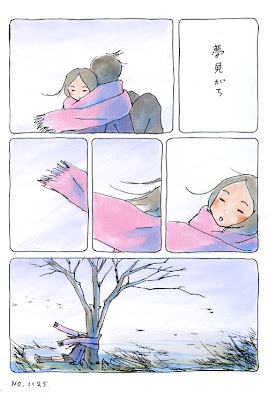It has been conducive, however, to falling asleep to radio plays at night... namely Torchwood radio plays... and I'm having difficulty getting myself to think about anything other than how damn cool Ianto Jones is.
And that, my friends, is how I surreptitiously sneak my personal life into this blog. You totally didn't even notice, did you? Masterful.
But I have had a bit of a chance to do more research, so let's get on with it, shall we?
1. GACHI
GACHI means "tends to", though it can be actually translated as a million other things. I think the idea it's supposed to present is that there is a proclivity for something, but it doesn't necessarily make it so all the time. So basically... "tends to". The page I am taking this from is from this page of her beautiful website:
http://juicyfruit.exblog.jp/7871394/
It has a very simple caption:
- 夢見がち
- Yume Migachi
and if you look at the image and assimilate what I told you of what the word GACHI means, you can see the inherent beauty and loneliness to this scene. There are a lot of commonly romantic images in Japan, one of which is sharing a scarf. Another is sharing and umbrella.
In the last scene, you can see that she is just tied to a tree, and not her lover.
The phrase, then, is a comment on her life.
- I tend to dream
Though I must admit, in this case, I thought I might just translate it as "daydream" despite the fact that there are four perfectly acceptable words to use instead simply because there is no subject indicated. But then again, when is there ever a subject indicated in Japanese? I decided against it in the end because it doesn't quite have the same feeling to it as "I tend to dream".
Also, did you know you can buy t-shirts that say that phrase? I sort of want one...
How to use GACHI:
- Pre-masu form+ GACHI
- because it's a tendency and it will continued to happen, do not worry about tense! No past tense, okay? :)
or
- Noun+ GACHI
I wish I could tell you more about the wonderful artist. There isn't really much to say. She does a fantastic web comic about a girl named Mikako which you can find here. From what I can tell, it's a part of Morning Manga, which is a branch of Kodansha publishing (I think!). It seems that you can buy the manga at stores these days, and I'm sorely tempted.
Our phrase comes from the PV for the manga, though it does appear in the manga itself. I'm being a bit lazy and not searching for it though, so I hope you'll forgive me. I'm also hoping I can sort of nudge you to check out the website yourself and take a look at her amazing work. The scene I will be talking about starts at 0:45.
The phrase I'm interested in is at 0:53:
- 「大丈夫」って答えるしかなかった。
- "Daijoubu" tte kotaeru shikanakatta.
I suppose, though, I should explain how to use SHIKA NAI first before translating the phrase and explaining the context.
SHIKA NAI basically means "no other way", or "have to". I tend to think of it in terms of something that had to be done because there was no other way, whereas other "have to" phrases such as NAKEREBANARANAI can indicate being forced to do it, as well as not having a choice in the matter. SHIKA NAI only speaks to the latter of that, and not the former.
The context which you can watch before is that her adopted mother asks her if she's okay. When she thinks about that, she realizes that adults are always asking that. Then her next phrase is:
- I had no other choice but to answer with "I'm okay".
- 「大丈夫」って答える (To answer with I'm okay) + しかなかった (I had not other choice)
You'll notice this particular phrase in the past tense. That is perfectly possible to do. Since she's narrating the story from some unknown future point, she will of course use SHINAKATTA.
How to make a SHIKANAI sentence:
- DICTIONARY FORM OF VERB + SHIKANAI
- Please remember that depending on the situation, you willl have to change SHIKANAI. For example, if you want to be polite, it's SHIKA ARIMASEN.
Both of this mangaka's works are pretty easy to understand due to the purposefully simple language she uses, and they are a great way to practice reading more artistic Japanese and absorbing cultural phenomenon. Please, please, please check them out!



No comments:
Post a Comment